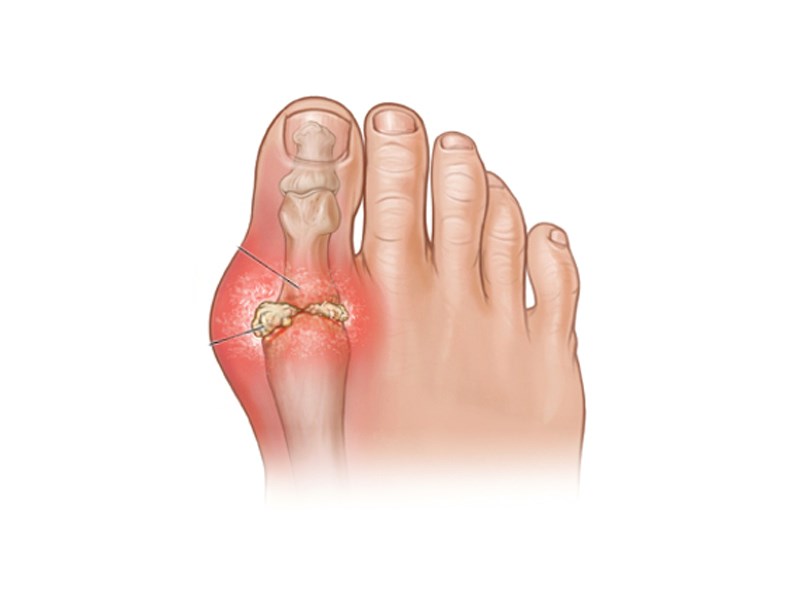
Gout
What is gout?
Gout is a kind of arthritis caused by uric acid crystals forming in one or more joints. Uric acid is a substance that forms when your body breaks down a substance called purines. This substance normally dissolves in your blood and passes through your kidneys into your urine. In people who have gout, uric acid builds up and can then form sharp crystals in the joint space. This causes pain and swelling in the affected joints.
What is a gout attack like?
The symptoms of gout may be sudden. They usually start at night, often in the big toe joint (but can also occur in the joints of the feet, ankles, knees, hands and wrists). The affected joint becomes red, feels hot and hurts. The joint hurts more when you touch it.
Who can develop gout?
If you eat a lot of foods that are rich in purines, you may be at an increased risk for gout. Some of these foods are salmon, sardines, organ meats, asparagus, mushrooms and herring.
You are more likely to develop gout if you’re overweight, drink excessive amounts of alcohol or have high cholesterol, diabetes or high blood pressure. Men develop gout more often than women. Women are more likely to develop gout after menopause. Gout is also hereditary (which means it runs in families).
Medicines that may cause gout include the following:
- Certain diuretics (“water pills”) used to treat high blood pressure
- Niacin (a B-complex vitamin)
- Aspirin (taken in low doses)
- Cyclosporine, which is used to prevent the body from rejecting a new organ after transplant surgery
- Some drugs used to treat cancer
- Pyrazinamide and ethambutol, which are used to treat tuberculosis
What should I do if I have a gout attack?
The sooner you get treatment, the sooner the pain will go away. Your doctor can prescribe medicine to help stop the joint swelling and pain. With treatment, your gout attack should go away in a few days. While having a gout attack, you should reduce the amount of animal protein you eat and avoid alcohol completely.
You should rest in bed during an attack of gout. Putting an ice pack on the joint may ease the pain. Keeping the weight of clothes or bedding off the joint can also help. Medicines that you can take without a prescription that reduce inflammation and pain may also help, such as ibuprofen (some brands: Motrin, Advil) and naproxen (one brand: Aleve). Your doctor can also prescribe medicine for you.
What can I do to avoid gout attacks?
Your doctor can prescribe medicines to prevent future gout attacks. These medicines can wash the uric acid from your joints, reduce swelling and decrease the amount of uric acid in your body. Because aspirin can interfere with the way these medicines work, you should ask your doctor before taking them both at the same time.
You should lose weight if you are overweight. If you have high blood pressure, high cholesterol or diabetes, you should get treatment for these conditions and follow a low-salt, low-fat diet.
Avoid alcohol and foods that are high in purines. Drink lots of water and other fluids, which can help flush uric acid from your body.
What if I don’t get treatment?
If you don’t get treatment, a gout attack can last for days or even weeks. If you keep having more attacks, more joints may become affected and the attacks will last longer.
If you have gout attacks for many years, you may develop tophi (say “toe-fee”). These are uric acid crystals that form lumps under the skin. Tophi usually form on the toes, fingers, hands and elbows. You may also develop kidney disease or kidney stones from uric acid crystals that collect in the urinary tract. Over time, even the bone around a joint may be destroyed by gout.
Questions to Ask Your Doctor
What treatment is best for me?
When can I expect my symptoms to improve?
Am I at risk for long-term joint damage?
Am I at risk for other types of arthritis?
What lifestyle changes can I make at home to relieve my pain and slow joint damage?